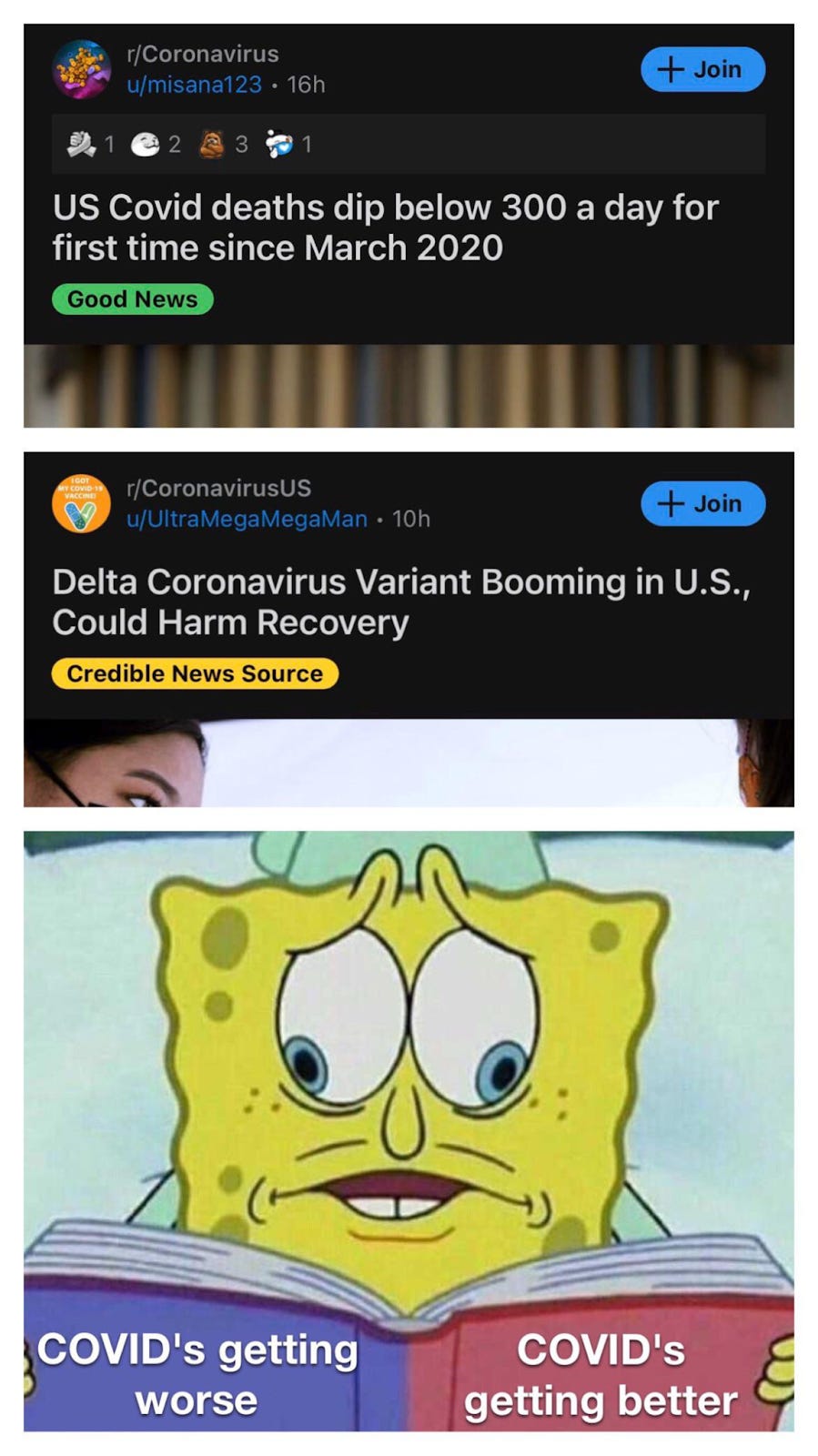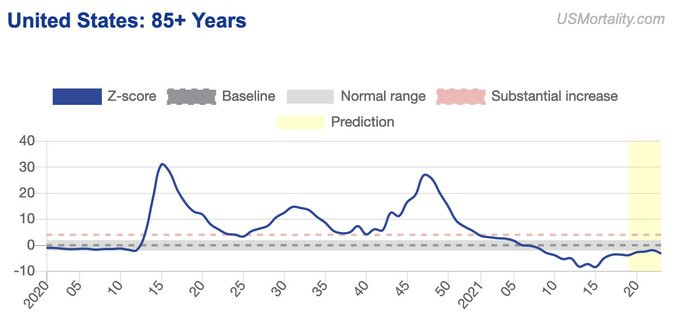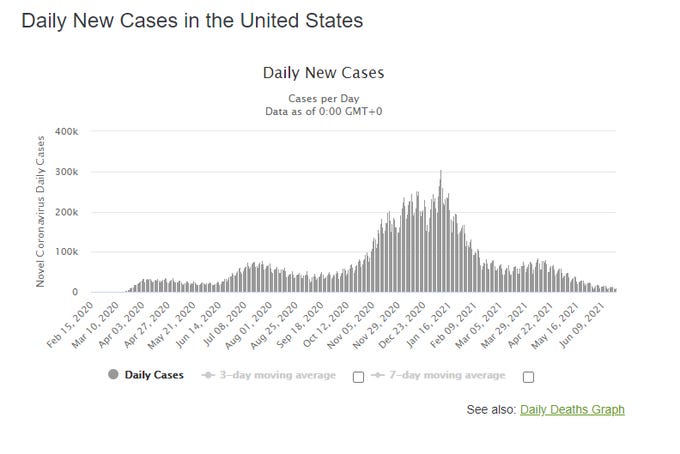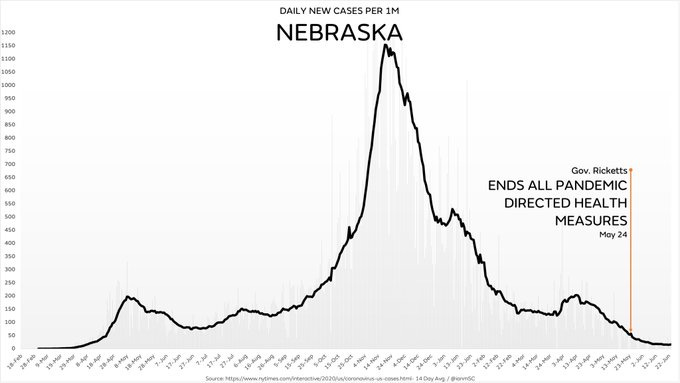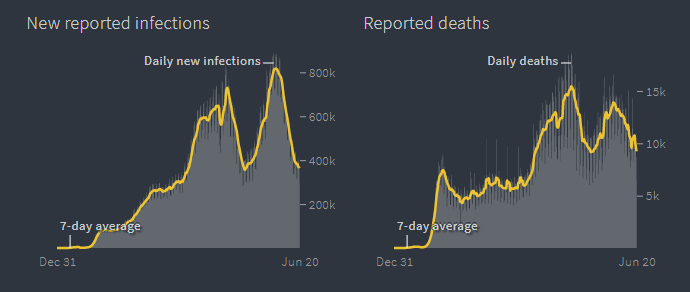Delta + / COVID Death Lows
While data continues to signal an end to COVID, reporting is focusing on variants. This week, the CDC is acknowledging that heart inflammation cases may be tied to the vaccine. WHO is saying that the general population will need boosters every two years. Borders are still closed in many places and debate about vaccine passports and other mandates continues. And deleted gene data from the beginning of the pandemic was recovered.
In other news:
David R Henderson on economic lessons from the pandemic at Reason
The guidance about COVID and children isn’t good for kids; Noah Rothman on MSNBC
Matt Ridley on how the UK government is keeping things closed because of flawed models.
A look at the history and risk of virology labs by Zeynep Tufekci in The New York Times
Want to support our work? Visit our Substack page and leave us a tip.
COVID News
CDC: Rare heart inflammation cases linked to Pfizer, Moderna vaccines
June 24 (UPI) -- The U.S. Centers for Disease Control and Prevention said more than 1,200 Americans, mostly under the age of 30, have developed a rare heart inflammation after receiving either the Pfizer-BioNTech or Moderna COVID-19 vaccine.
During a meeting of the CDC's Advisory Committee on Immunization Particles on Wednesday, health officials presented slides that said as of June 11 a total of 1,226 cases of myocarditis or pericarditis have been reported, with the CDC confirming 323 cases among those below the age of 29.
Of those cases, 309 were hospitalized, with 295 having been discharged as of June 11, it said.
Chinese Covid-19 Gene Data That Could Have Aided Pandemic Research Removed From NIH Database
Chinese researchers directed the U.S. National Institutes of Health to delete gene sequences of early Covid-19 cases from a key scientific database, raising concerns that scientists studying the origin of the pandemic may lack access to key pieces of information.
The NIH confirmed that it deleted the sequences after receiving a request from a Chinese researcher who had submitted them three months earlier.
“Submitting investigators hold the rights to their data and can request withdrawal of the data,” the NIH said in a statement.
The removal of the sequencing data is described in a new paper posted online Tuesday by Jesse Bloom, a virologist at the Fred Hutchinson Cancer Research Center in Seattle. The paper, which hasn’t been peer reviewed, says the missing data include sequences from virus samples collected in the Chinese city of Wuhan in January and February of 2020 from patients hospitalized with or suspected of having Covid-19.
EXCLUSIVE WHO estimates COVID-19 boosters needed yearly for most vulnerable
BRUSSELS, June 24 (Reuters) - The World Health Organization (WHO) forecasts that people most vulnerable to COVID-19, such as the elderly, will need to get an annual vaccine booster to be protected against variants, an internal document seen by Reuters shows.
The estimate is included in a report, which is to be discussed on Thursday at a board meeting of Gavi, a vaccine alliance that co-leads the WHO's COVID-19 vaccine programme COVAX. The forecast is subject to changes and is also paired with two other less likely scenarios.
Vaccine makers Moderna Inc (MRNA.O) and Pfizer Inc (PFE.N), with its German partner BioNTech (22UAy.DE), have been vocal in their view that the world will soon need booster shots to maintain high levels of immunity, but the evidence for this is still unclear.
The document shows that the WHO considers annual boosters for high-risk individuals as its "indicative" baseline scenario, and boosters every two years for the general population.
House votes for 'vaccine passports,' Health secretary limits
https://www.wtae.com/article/pennsylvania-vaccine-passport-house-vote/36825770
HARRISBURG, Pa. (AP) —
Republicans in the Pennsylvania House on Wednesday voted to ban the use of so-called COVID-19 "vaccine passports" by colleges, universities or governmental entities and to put new restrictions on the health secretary's powers during a health emergency.
Representatives voted 112-89, on party lines, to approve the measure that supporters described as a way to protect private health information, but opponents warned would needlessly endanger public health.
The bill would prevent the state health secretary from ordering closures and from requiring people who have not been exposed to a contagion to physically distance, wear a mask, "conduct a specific hygienic practice" such as hand-washing, quarantine or restrict travel.
The Wolf administration believes those restrictions, if enacted, would apply in all cases, not just during the ongoing coronavirus pandemic.
The proposal was amended in the House, so has to go back to the state Senate for another vote before it can land on Democratic Gov. Tom Wolf's desk. Wolf said he will veto it.
Commentary/Analysis
Economic Lessons From COVID-19
https://reason.com/2021/05/01/economic-lessons-from-covid-19/
One of the most important things economists can do in a pandemic is not forget what we know. We know that central planners don't have enough information and insight about the lives and activities of 330 million people to plan those lives in a thoughtful way. We know the problems that emerge when you distribute something valuable by giving it away. We know that government officials face bad incentives. We know that externalities pose problems for the straightforward "leave it to the market" viewpoint, but that large government interventions create new problems. In the rush to make pandemic policy, too many of these lessons were cast aside.
Central Planning
One of the most important controversies of the 20th century was the economic calculation debate. In his 1922 book, Socialism, Ludwig von Mises argued that without markets, central planners would not know how to "calculate." Specifically, they wouldn't know how many of various goods to produce, how to produce them, and whom to allocate them to. In the 1930s and 1940s, Mises' student Friedrich Hayek advanced the argument by noting the ways an economy depends on dispersed information that exists in the minds of millions of people. This information about individuals' "circumstances of time and place," he wrote, could not be captured by a central planner. Hayek's most famous contribution to the debate was his 1945 article "The Use of Knowledge in Society," published in the American Economic Review. That article led modern Hayekians to use the phrase "local knowledge" as a shorthand for Hayek's "circumstances of time and place."
EDITORIAL: Hard lessons from the pandemic
BACK IN May 2020, when the COVID-19 pandemic was still largely uncharted territory, we wondered if the state-mandated lockdowns of “non-essential” businesses, social distancing, wearing masks, disinfecting public spaces and screening for symptoms of illness would become a regular part of doing business in Virginia.
Those rules are now up for either revision or repeal. In a letter to the 14-member Virginia Safety and Health Codes Board, Gov. Ralph Northam stated that while the first state COVID-19 rules in the nation saved lives, they are no longer in sync with guidance provided by the Centers for Disease Control and Prevention or with “improving conditions across the Commonwealth.”
Fifteen months into the worst pandemic in a hundred years, there is now more data to show what worked—and what didn’t.
A year ago, Shane Chalke, a former editor and referee at the North American Actuarial Journal, told The Free Lance–Star that by analyzing publicly available data released by the CDC, the Virginia Department of Health, and other state health departments across the nation, it was already clear to him that the risk of dying from COVID-19 was largely based on age. For that reason, he advised state and local government officials to “unlock demographically, not geographically.”
Flawed modelling is condemning Britain to lockdown
https://www.telegraph.co.uk/news/2021/06/21/flawed-modelling-condemning-britain-lockdown/
Britain leads the pack on vaccination, but lags far behind America, Germany and France on liberation. A big reason is that our Government remains in thrall to a profession that has performed uniquely badly during the pandemic: modellers. The Government’s reliance on Sage experts’ computer modelling to predict what would happen with or without various interventions has proved about as useful as the ancient Roman habit of consulting trained experts in “haruspicy” – interpreting the entrails of chickens.
As Sarah Knapton has revealed in these pages, the brutal postponement of Freedom Day coincided with the release of a bunch of alarmist models predicting a huge new wave of deaths. The most pessimistic, inevitably from Imperial College, estimated at the extreme end of its range of scenarios 203,824 deaths over the next year. It did so by assuming a range of possible percentage reductions in hospitalisations following two vaccinations. Imperial's data on vaccine efficacy assumed 87% for AstraZeneca, 90% for Pfizer or in a worse case scenario just 77 per cent for Astra Zeneca and 84% for Pfizer. The real world data published after the Imperial modelling shows two vaccinations to be between 92 per cent (AstaZeneca) and 96 per cent (Pfizer) effective in preventing hospitalisation. That would cut the Imperial forecast of deaths by a gob smacking 90 per cent to 26,854.
Where Did the Coronavirus Come From? What We Already Know Is Troubling.
https://www.wsj.com/articles/are-covid-vaccines-riskier-than-advertised-11624381749
One remarkable aspect of the Covid-19 pandemic has been how often unpopular scientific ideas, from the lab-leak theory to the efficacy of masks, were initially dismissed, even ridiculed, only to resurface later in mainstream thinking. Differences of opinion have sometimes been rooted in disagreement over the underlying science. But the more common motivation has been political.
Another reversal in thinking may be imminent. Some scientists have raised concerns that the safety risks of Covid-19 vaccines have been underestimated. But the politics of vaccination has relegated their concerns to the outskirts of scientific thinking—for now.
Historically, the safety of medications—including vaccines—is often not fully understood until they are deployed in large populations. Examples include rofecoxib (Vioxx), a pain reliever that increased the risk of heart attack and stroke; antidepressants that appeared to increase suicide attempts among young adults; and an influenza vaccine used in the 2009-10 swine flu epidemic that was suspected of causing febrile convulsions and narcolepsy in children. Evidence from the real world is valuable, as clinical trials often enroll patients who aren’t representative of the general population. We learn more about drug safety from real-world evidence and can adjust clinical recommendations to balance risk and benefits.
Research
Necessity of COVID-19 vaccination in previously infected individuals
https://www.medrxiv.org/content/10.1101/2021.06.01.21258176v2
ABSTRACT
Background The purpose of this study was to evaluate the necessity of COVID-19 vaccination in persons previously infected with SARS-CoV-2.
Methods Employees of the Cleveland Clinic Health System working in Ohio on Dec 16, 2020, the day COVID-19 vaccination was started, were included. Any subject who tested positive for SARS-CoV-2 at least 42 days earlier was considered previously infected. One was considered vaccinated 14 days after receipt of the second dose of a SARS-CoV-2 mRNA vaccine. The cumulative incidence of SARS-CoV-2 infection over the next five months, among previously infected subjects who received the vaccine, was compared with those of previously infected subjects who remained unvaccinated, previously uninfected subjects who received the vaccine, and previously uninfected subjects who remained unvaccinated.
Results Among the 52238 included employees, 1359 (53%) of 2579 previously infected subjects remained unvaccinated, compared with 22777 (41%) of 49659 not previously infected. The cumulative incidence of SARS-CoV-2 infection remained almost zero among previously infected unvaccinated subjects, previously infected subjects who were vaccinated, and previously uninfected subjects who were vaccinated, compared with a steady increase in cumulative incidence among previously uninfected subjects who remained unvaccinated. Not one of the 1359 previously infected subjects who remained unvaccinated had a SARS-CoV-2 infection over the duration of the study. In a Cox proportional hazards regression model, after adjusting for the phase of the epidemic, vaccination was associated with a significantly lower risk of SARS-CoV-2 infection among those not previously infected (HR 0.031, 95% CI 0.015 to 0.061) but not among those previously infected (HR 0.313, 95% CI 0 to Infinity).
Conclusions Individuals who have had SARS-CoV-2 infection are unlikely to benefit from COVID-19 vaccination, and vaccines can be safely prioritized to those who have not been infected before.
Summary Cumulative incidence of COVID-19 was examined among 52238 employees in an American healthcare system. COVID-19 did not occur in anyone over the five months of the study among 2579 individuals previously infected with COVID-19, including 1359 who did not take the vaccine.
Charts and Graphics
International News
China to keep COVID-19 border restrictions for another year - WSJ
June 22 (Reuters) - China plans to keep pandemic border restrictions in place for at least another year amid fears over the emergence of new variants and a calendar of sensitive events, the Wall Street Journal reported on Tuesday, citing people familiar with the matter.
The provisional timeline for the second half of 2022 was set during a meeting of China's cabinet, or State Council, in mid-May, the WSJ said.
China sharply reduced transport links with other countries as the coronavirus, which first emerged in the central Chinese city of Wuhan in late 2019, spread around the world last year.
The capital, Beijing, is due to host the Winter Olympics and the Winter Paralympics in February 2022, bringing thousands of participating athletes to the country.




